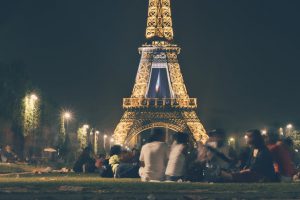 With the first round of the French election results in, and no major candidates even managing to get a quarter of the total votes, two candidates remain: Marine Le Pen of the National Front, a populist and nationalist party, and Emmanuel Macron, the center-Left candidate of the “En Marche!” (“On Our Way”) political party. Samuel Gregg covers the current politically disjointed state of France in a new article for First Things. He maintains an attitude of skepticism and uncertainty towards France’s future, lamenting its fall from grace and conceding that it is a “broken country.” On the election results, Gregg says:
With the first round of the French election results in, and no major candidates even managing to get a quarter of the total votes, two candidates remain: Marine Le Pen of the National Front, a populist and nationalist party, and Emmanuel Macron, the center-Left candidate of the “En Marche!” (“On Our Way”) political party. Samuel Gregg covers the current politically disjointed state of France in a new article for First Things. He maintains an attitude of skepticism and uncertainty towards France’s future, lamenting its fall from grace and conceding that it is a “broken country.” On the election results, Gregg says:
The results of the first round of France’s 2017 presidential election have predictably been portrayed as embodying a struggle between “globalists” and “nationalists” that is replicated across the world. This division will be further underscored by the election’s second round, between Emmanuel Macron and Marine Le Pen, insofar as they are regarded as symbolizing this split.
But the deeper—and more troubling—reality is that France’s election illustrates the degree to which a nation once considered the epitome of European civilization has entered, like much of the rest of the West, a state of advanced decline and political paralysis.
Gregg, although disheartened by the current political crises in France, acknowledges two interesting developments: the rejection of establishment politics and increased Euroskepticism on the left and the right:
Despite the fragmentation, some general trends were highlighted by the election’s first round. One is dissatisfaction with the establishment political parties. This year marks the first time since the beginning of the Fifth Republic that a Gaullist candidate did not reach the second round. Perhaps even more significant is the collapse of the Socialist Party, the electorally successful center-left and left alliance painstakingly assembled by the late François Mitterrand. The Socialists fielded Benoît Hamon, one of the most inept mainstream candidates in a very long time. The party that won the presidency just five years ago received barely 6 percent of the vote.
A second development worth noting: By my calculation, almost 50 percent of French voters supported parties, of the right or left, that are committed to hard or soft Euroskepticism. It’s unlikely that a majority of French voters will choose “Frexit” in the near future. They know just how much France’s stagnant and overregulated economy is propped up by its closeness to the more dynamic Germany. But Macron’s Europhilia shouldn’t blind us to the reality that one-half of the Paris-Berlin axis, which has been core to the European integration project (even more so in the wake of Brexit), is increasingly unenthusiastic about the European Union. In other words, whatever one thinks of supranational projects, views of European integration now constitute yet another deep fissure in the already fractured French body politic, which once was a driving force for integration.
In conclusion, Gregg affirms that although France’s future looks bleak, we should not read into its politics too deeply and, in the least, the current dissolution of France is a warning to the rest of the West:
It gives me no pleasure to be so pessimistic about France. Like many others in the Anglo-American world, I have long been fascinated by French history, love the language of Molière and Chateaubriand, admire the political thought of Montesquieu and Tocqueville, and treasure the example of great saints like Thérèse of Lisieux and Louis de Montfort. Great contemporary intellectuals such as Rémi Brague, Pierre Manent, and Philippe Bénéton are among the first points of reference for many of us as we seek to understand the thought of the ancient, medieval, and post-Enlightenment worlds.
To the extent, however, that France’s brokenness mirrors the social, political, and economic crumbling of the West, we should all be worried. Elections are about many things, and we should be wary of reading too much into them. Sometimes, however, they provide insight into the collective state of mind of societies. And what this election is telling us about France bodes ill for all of us.
To read the original article by Gregg, click here.
Images are CCO.
